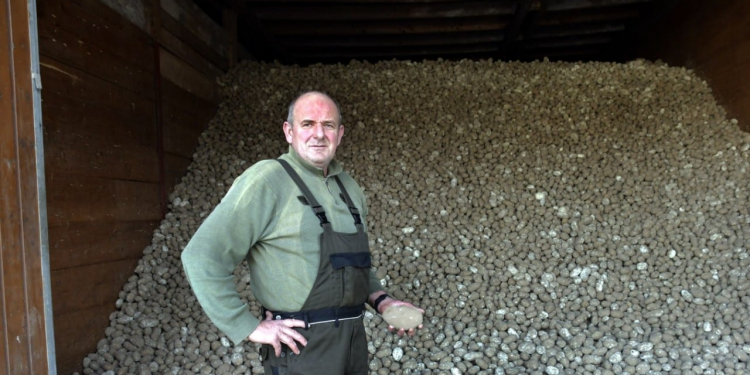Because the catering industry hardly sells french fries anymore, the demand is low and the prices are in the basement. Part of the harvest now goes to biogas plants and the farmers receive 1.50 euros for 100 kilograms
When food is destroyed instead of eaten, something is wrong. This is exactly what is happening in the potato industry at the moment. Farmers have to bring their products to the biogas plants by the ton because a large part of the catering trade is canceled due to Corona. As a result, prices have fallen sharply, especially for processing potatoes, which customers usually use to make french fries. This particularly affects areas like the Erdinger district, in which potato cultivation is a focus.
Johann Heilinger is angry. Four years ago he took over the business from his father. He grows potatoes on 70 hectares and this year the harvest was above average. “A good yield cannot save what a bad price destroys,” says the Niederdinger. A year ago he got 15 euros for 100 kilos of processing potatoes. There are currently five.
In China, the world’s largest cultivation country, the market collapsed due to the corona – with enormous effects on the world market and price developments. The current price does not even cover the costs for cultivation and storage, which are around 8.50 euros.
While he can sell at least 85 percent of his goods under contract to central buyers such as the potato processor Aviko Deutschland GmbH in Rain am Lech, he finds no buyers for the remaining 15 percent, the so-called freely traded goods. “It ends up completely in the biogas plant,” says Heilinger. He has also not yet received anything from the corona aid from the federal and state levels.
In the Eittingen biogas plant alone, 15 to 20 tons are currently destroyed every day, according to Konrad Zollner, Chairman of the Bavarian Potato Producers: “With potatoes, it is a balancing act between food and garbage”. Johann’s father Reinhold Heilinger calls this a “huge dilemma”, and the prospects for the next year “are not at all good”. Many customers would already cut contracts and quantities for the next year and “break” the contracts. Precisely because the cultivation requires long-term planning because of the crop rotation, one can react badly to this. Potatoes can only be grown in the same place every three to four years.

Prices have also fallen sharply in the organic sector. Here, however, there are fewer sales difficulties than in the conventional area, as the products are usually marketed directly, including in farm shops and supermarkets. Martin Reischl grows organic potatoes on two and a half hectares, also in Niederding. He took over the business two years ago and has since then gradually switched to organic farming. A part is still produced conventionally. The demand for organically produced potatoes has risen sharply. “In these Corona times, which are slowing down for many, more people are eating at home and are more interested in conscious nutrition,” says Reischl. He sees himself more as a winner of the crisis. Nevertheless, the price pressure does not stop at its operation. Last year he got 60 euros for 100 kilos, this year it’s 35, so the Niederdinger. The financial outlay is roughly double that of conventionally produced potatoes.
According to Zollner, the potato farmers have invested a lot in cold stores and germ inhibitors in order to increase the shelf life of the quickly perishable potatoes and to be able to offer them all year round. And the cultivation areas were also enlarged. Many would now, however, reduce cultivation again significantly in the next year because the risk is too high for them.







